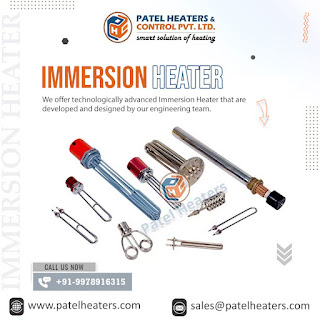The Energy Efficiency of Immersion Heater: How They Conserve Energy in Heating Applications
In an era where energy conservation and sustainability are paramount, the efficiency of heating systems is of utmost importance. Immersion heater, with their ability to heat fluids quickly and precisely, play a crucial role in various heating applications.
What is Immersion Heater?
The heaters are electric heating devices with a heating element enclosed in a protective sheath. These heaters are designed to be submerged in a fluid, such as water, oil, or chemicals, to raise their temperature to the desired level. The heating element generates heat when an electric current passes through it, which is then transferred to the surrounding fluid through conduction.
Factors Contributing to Energy Efficiency
● Rapid Heating: One of the critical factors contributing to heaters' offered by Immersion Heater suppliers in India, is energy efficiency is their ability to heat fluids quickly. The heating elements are designed to provide high-power density, enabling fast heat transfer and reducing the heating time required to reach the desired temperature.
● Direct Heat Transfer: Operate by directly heating the submerged fluid. This direct heat transfer minimizes energy losses in other heating systems, such as those involving heat exchangers or indirect heating methods.
● Precise Temperature Control: Immersion heater offers precise temperature control, ensuring the fluid is heated to the desired temperature without unnecessary energy expenditure. Temperature sensors and thermostats can be incorporated into the heating system to accurately monitor and regulate the temperature, avoiding overheating or energy wastage.
● Localized Heating: Provide localized heating, which means they heat only the fluid in their immediate vicinity. This localized approach is beneficial when specific areas or volumes of the fluid need to be heated, preventing unnecessary energy consumption from heating the entire system.
● High Thermal Efficiency: Designed to have high thermal efficiency, which refers to the ratio of heat output to electrical input. Modern heaters are constructed with advanced heating elements and materials that maximize heat transfer efficiency, minimizing energy losses and maximizing the utilization of electrical energy.
Major Need for Energy Efficiency in Immersion Heater
● Reduced Energy Consumption: The energy efficiency of heaters translates into reduced energy consumption. By heating fluids quickly and directly, they minimize energy losses and waste, resulting in lower energy bills and reduced environmental impact.
● Cost Savings: The heaters' energy efficiency reduces energy consumption and leads to cost savings. With less energy required for heating, businesses and individuals can save on operational costs, making heaters a financially viable choice for various applications.
● Environmental Sustainability: Energy-efficient heaters contribute to environmental sustainability by reducing greenhouse gas emissions associated with energy production. They help conserve natural resources and mitigate climate change by minimizing energy consumption.
● Improved System Performance: Heaters' energy efficiency ensures optimal performance of heating systems. Providing rapid and precise heating enables efficient operation, productivity, and performance in various applications, including industrial processes, water heating, and chemical reactions.
Considerations for Optimizing Energy Efficiency
To optimize the energy efficiency of heaters, several considerations should be taken into account:
● Proper Sizing: Choosing the right size of the immersion heater is essential for energy efficiency. Undersized heaters may need help to meet the heating demands, leading to prolonged heating times and energy wastage. On the other hand, large heaters can result in excessive energy consumption.
● Insulation: Proper insulation of the heating system and storage tanks can enhance energy efficiency by minimizing heat loss to the surroundings. Insulation materials with high thermal resistance should prevent heat dissipation and maintain the desired temperature for longer.
● Regular Maintenance: Regular maintenance of heaters ensures their optimal performance and energy efficiency. Cleaning the heating elements, checking electrical connections, and replacing worn-out components are essential for maximizing efficiency and preventing energy losses.
● Automation and Controls: Incorporating advanced automation and control systems can enhance energy efficiency. These systems can monitor and adjust temperature settings, optimize heating cycles, and ensure precise temperature control, minimizing energy wastage and improving overall system efficiency.
Conclusion
These heaters are energy-efficient heating devices that offer rapid and precise heating of fluids in various applications. The benefits of energy efficiency in heaters include reduced energy consumption, cost savings, environmental sustainability, and improved system performance. Although there are multiple options for Immersion heater manufacturers in India, Patel Heaters & Control Pvt Ltd is indeed the leading name in the industry.




Comments
Post a Comment